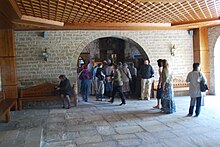
Back الدين في اليونان Arabic Religió a Grècia Catalan Θρησκεία στην Ελλάδα Greek Religión en Grecia Spanish Religion en Grèce French Religija u Grčkoj Croatian Կրոնը Հունաստանում Armenian Agama di Yunani ID Religioni in Grecia Italian Relijio en Elas LFN
Religion in Greece (2022)[1]
Religion in Greece is dominated by Christianity, in particular the Greek Orthodox Church, which is within the larger communion of the Eastern Orthodox Church. It represented 81% of the total population in 2022[1] and is constitutionally recognized as the "prevailing religion" of Greece. Religions with smaller numbers of followers include Islam (comprising 2%[2] of the population), Roman Catholicism (comprising 1%[2] of the population), Greek Catholicism, Judaism, Evangelicalism, Hellenic paganism, and Jehovah's Witnesses. A number of Greek atheists exist, not self-identifying as religious.
Religion is key part of identity for most Greeks, with 76% of Greeks in a 2015–2017 survey saying that their nationality is defined by Christianity.[3] According to other sources, 81.4% of Greeks identify as Orthodox Christians and 14.7% are Non-Religious.[4]

- ^ a b Cite error: The named reference
US2022was invoked but never defined (see the help page). - ^ a b "Religious Belief and National Belonging in Central and Eastern Europe". Pew Research Center. 10 May 2017. Retrieved 2017-09-09.
- ^ "Religion is key part of identity for most Greeks". Kathimerini. Retrieved 2018-11-02.
- ^ "Easter, Faith and Religion in Greece". Kapa Research.